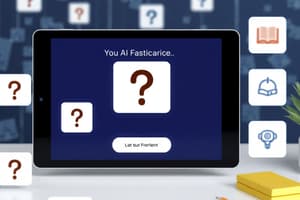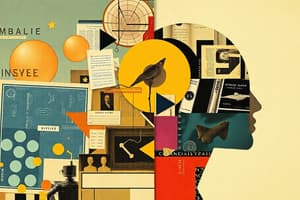Podcast
Questions and Answers
Considering the tech stack outlined for the AI-powered study app, what is the primary rationale behind selecting React Native with Expo over native iOS and Android development?
Considering the tech stack outlined for the AI-powered study app, what is the primary rationale behind selecting React Native with Expo over native iOS and Android development?
- React Native offers superior performance capabilities compared to native development, particularly in AI processing.
- Utilizing React Native ensures greater compatibility with Supabase for backend integration and data management.
- Expo's managed workflow provides streamlined cross-platform development, which accelerates development time. (correct)
- Native development lacks support for OCR technology, making it unsuitable for image-based note extraction.
In the context of integrating AI quiz generation into the study app, what critical challenge needs to be addressed when deploying Llama and Mistral models?
In the context of integrating AI quiz generation into the study app, what critical challenge needs to be addressed when deploying Llama and Mistral models?
- Optimizing the models for offline processing to enable quiz generation without an active internet connection.
- Managing the computational resources required by these models to minimize latency and ensure real-time quiz creation. (correct)
- Ensuring seamless compatibility between Llama and Mistral to avoid conflicts during quiz generation.
- Adapting the models to support multiple languages, broadening the app's accessibility for diverse user groups.
Given the development plan, what is the most significant risk associated with implementing offline mode using SecureStore or SQLite, and how might this risk impact user experience?
Given the development plan, what is the most significant risk associated with implementing offline mode using SecureStore or SQLite, and how might this risk impact user experience?
- The risk of unauthorized access to stored notes if encryption keys are compromised, impacting user privacy. (correct)
- Conflicts with AI quiz generation, causing inaccurate or incomplete quizes when offline.
- Decreased application performance due to excessive data encryption, resulting in sluggish note retrieval.
- The potential for data loss during synchronization, leading to a fragmented user experience.
Considering the MVP development timeline, what strategic advantage is gained by prioritizing UI development and frontend implementation in the initial weeks?
Considering the MVP development timeline, what strategic advantage is gained by prioritizing UI development and frontend implementation in the initial weeks?
In the context of potential premium features and monetization pathways for the AI-powered study app, which strategy would most effectively balance user value and revenue generation?
In the context of potential premium features and monetization pathways for the AI-powered study app, which strategy would most effectively balance user value and revenue generation?
Considering the application's architecture, what is the MOST significant advantage of incorporating both online (Llama) and offline (Mistral) AI models for quiz generation?
Considering the application's architecture, what is the MOST significant advantage of incorporating both online (Llama) and offline (Mistral) AI models for quiz generation?
How does the note-sharing feature MOST effectively balance collaboration with intellectual property protection within the AI-powered study app?
How does the note-sharing feature MOST effectively balance collaboration with intellectual property protection within the AI-powered study app?
Which of the following strategies would BEST leverage the AI's capabilities to personalize the learning experience for individual users?
Which of the following strategies would BEST leverage the AI's capabilities to personalize the learning experience for individual users?
What is the MOST critical factor to consider when evaluating the performance of the OCR (Optical Character Recognition) technology used for handwritten notes in the application?
What is the MOST critical factor to consider when evaluating the performance of the OCR (Optical Character Recognition) technology used for handwritten notes in the application?
In the context of developing a monetization strategy for the AI-powered study app, which premium feature would MOST directly appeal to users seeking enhanced learning outcomes?
In the context of developing a monetization strategy for the AI-powered study app, which premium feature would MOST directly appeal to users seeking enhanced learning outcomes?
Which of the following scenarios would MOST effectively demonstrate the advantage of using Llama over Mistral in the AI-powered study app?
Which of the following scenarios would MOST effectively demonstrate the advantage of using Llama over Mistral in the AI-powered study app?
How might the implementation of manual AI mode selection impact the overall user experience of the study app?
How might the implementation of manual AI mode selection impact the overall user experience of the study app?
What potential security risk should be MOST carefully considered concerning the implementation of the 'Collaborative Notebooks' feature?
What potential security risk should be MOST carefully considered concerning the implementation of the 'Collaborative Notebooks' feature?
Flashcards
React Native
React Native
Cross-platform app development framework.
React Native Paper
React Native Paper
Framework for UI components in React Native.
Supabase
Supabase
Backend platform for database and authentication.
OCR Technology
OCR Technology
Signup and view all the flashcards
SecureStore or SQLite
SecureStore or SQLite
Signup and view all the flashcards
Note-Taking System
Note-Taking System
Signup and view all the flashcards
AI-Powered Quiz Generation
AI-Powered Quiz Generation
Signup and view all the flashcards
Llama (Online AI Model)
Llama (Online AI Model)
Signup and view all the flashcards
Mistral (Offline AI Model)
Mistral (Offline AI Model)
Signup and view all the flashcards
Key Points Extraction
Key Points Extraction
Signup and view all the flashcards
Notebook Sharing (Limited Access)
Notebook Sharing (Limited Access)
Signup and view all the flashcards
Manual AI Mode Selection
Manual AI Mode Selection
Signup and view all the flashcards
Collaborative Notebooks
Collaborative Notebooks
Signup and view all the flashcards
Study Notes
- The AI-powered study application aims to help users create and refine study materials by allowing them to take notes in various formats.
- AI-generated quizzes will be available to test their knowledge.
- The app will provide both online and offline AI assistance to maintain smooth functionality in all conditions.
Core Features of the MVP
- Users can input notes via text, images, and handwritten notes.
- The app automatically generates quiz questions from user notes.
- AI ensures quiz accuracy by verifying with web sources where possible.
- Users can only take quizzes based on uploaded notes and cannot modify shared notes.
- Llama (Online Mode) provides accurate responses when a network connection is available.
- Mistral (Offline Mode) ensures basic functionality even when offline.
- The application seamlessly switches between the two AI modes.
- AI will summarize notes into key points for quick revision.
- Users can share their notes with others, but recipients can only generate quizzes; they cannot edit or modify the notes.
- Notes have an expiration date (optional feature for future versions).
Future Features (Post-MVP Considerations)
- In a future version, users can manually switch between online and offline AI.
- Collaborative Notebooks are planned, for multiple users to work on shared notes in the future
- Study reminders will be available based on quiz history.
- Multilingual Support will include support for additional languages beyond English.
- Additional features are planned for extended note storage, advanced AI-generated explanations and higher accuracy for OCR and quiz generation.
Tech Stack & Tools
- React Native + Expo for seamless cross-platform development will be used in the frontend.
- React Native Paper is optional for UI components.
- Supabase is being used for database and authentication.
- Llama & Mistral are for AI quiz generation.
- OCR Technology is used for extracting text from handwritten notes/images.
- SecureStore or SQLite is being used for offline note storage.
Development Plan
- The MVP development timeline is estimated at 6-8 weeks.
- Weeks 1-2 are spent designing the UI and building the frontend with Expo.
- Weeks 2-3 will implement text-based note-taking and image-based OCR.
- Weeks 3-4 involve integrating AI quiz generation (Llama & Mistral).
- Weeks 4-5 are allocated to developing offline mode and key points extraction.
- Weeks 5-6 will implement note sharing and limited access.
- Weeks 6-7 are about optimizing performance and running user testing.
Next Steps
- UI Development (React Native + Expo) will be implemented.
- AI Models (Llama & Mistral) will be set up.
- Note Input & Storage Features will be developed.
- AI Quiz Generation Integration will begin.
- The AI-powered study app has strong potential for both personal and academic use, transforming user notes into interactive quizzes while ensuring offline functionality.
Studying That Suits You
Use AI to generate personalized quizzes and flashcards to suit your learning preferences.
Related Documents
Description
AI-powered study application for creating and refining study materials. Input notes via text, images, and handwritten notes. Automatically generate quizzes, with online and offline AI assistance. Summarize notes into key points for quick revision.




